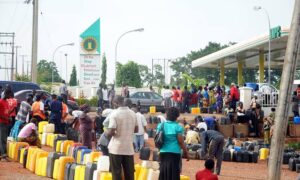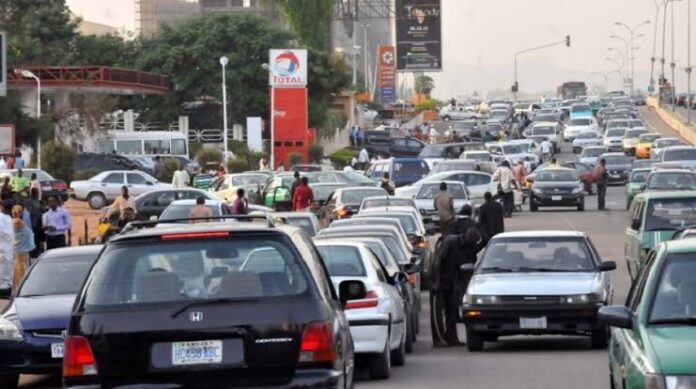In Nigeria, the fuel crisis has gotten much worse, especially in Lagos. Drivers are struggling to find petrol and are spending hours in long lines at gas stations. Some are even staying overnight just to get fuel. This shows how serious the shortage has become.

Independent fuel sellers are taking advantage of the situation by raising their prices to as much as N920 per litre, much higher than the usual rates. On the other hand, major sellers have kept their prices around N618 to N620 per litre. This difference in prices has made the situation worse, leading to long queues and heavy traffic in important parts of the city, as people rush to stations with cheaper fuel.
Besides the official market, the black market is thriving. For example, on Mobolaji Bank Anthony Way, black market prices have shot up to N1,200 per litre. This illegal trade is booming because many gas stations can’t meet the demand due to irregular deliveries.
Fuel depots in Apapa are facing problems too. There are no ships bringing in new fuel, leaving the docking spaces empty for days, which is very unusual and shows how deep the crisis is. Those who do have fuel are raising their prices, taking advantage of people’s desperation.
Olufemi Soneye, the Chief Corporate Communications Officer at the Nigerian National Petroleum Company Ltd (NNPC), explained that the problem is due to issues with some ships delivering fuel. He assured that the company is working hard with all parties involved to fix the problem and get fuel supplies back to normal.
The crisis is hitting not just consumers but also the operators of fuel stations. Billy Gillis-Harry, the National President of the Petroleum Products Retail Outlets Owners Association of Nigeria (PETROAN), voiced his frustration over the repeated shortages. He pointed out that fuel station owners can only sell what they have, and when supply problems happen, they are left with nothing to sell. This shortage is making it hard for businesses to cover their costs, including paying their workers.
Gillis-Harry also mentioned a big problem in the market: the lack of competition. NNPC Ltd is the only company importing petroleum products. Even though the Nigerian Midstream and Downstream Petroleum Regulatory Authority (NMDPRA) has given licenses for independent imports, the shortage of foreign currency is making it difficult to buy supplies.
Adding to the problem, Zarma Mustapha, Deputy National President of the Independent Petroleum Marketers Association of Nigeria (IPMAN), noted that an upcoming nationwide protest is causing more fuel queues. He said that the uncertainty about the protest is making transporters and marketers reluctant to send out trucks to deliver fuel, fearing possible disruptions.
Mustapha called on those planning to protest to do so peacefully and avoid violence or property damage. He emphasized that while protesting is a right, it should be done responsibly, especially given the current fuel crisis.
To solve this fuel crisis, a comprehensive approach is needed. The government and industry stakeholders must quickly address the supply chain issues, stabilize fuel prices, and ensure fair competition in the market. Only then can the country hope to ease the difficulties faced by its citizens and businesses.




